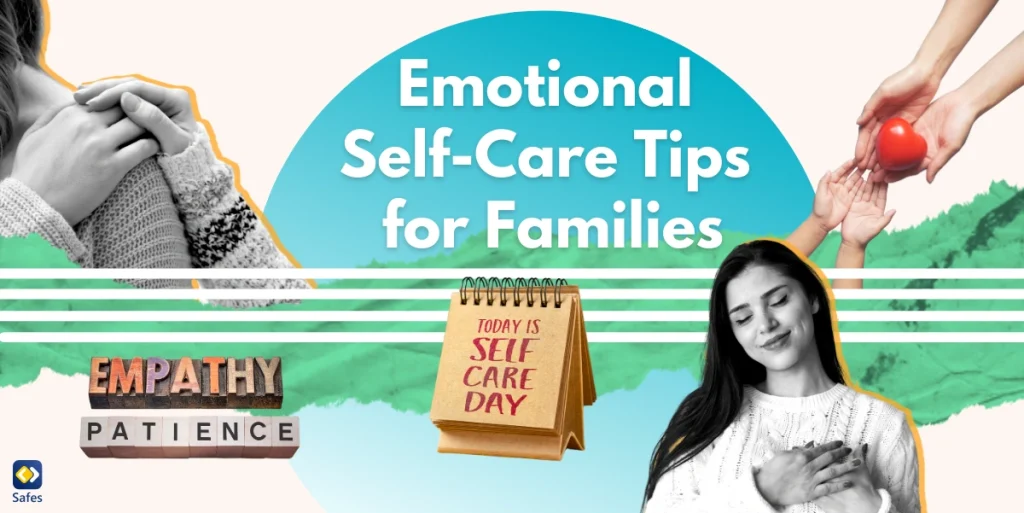Life as a parent can be a whirlwind, right? Between school runs, work, and household chores, it’s easy to overlook the importance of practicing self-care. Yet, self-care isn’t a luxury; it’s a necessity. By taking care of yourself emotionally, you’re better equipped to care for your family, making everyone happier and healthier.
Download and Start Your Free Trial of the Safes Parental Control App
Focusing on emotional self-care is crucial for parents. Why? Because your emotional health impacts every aspect of your life, from how you interact with your kids to how you handle stress. When you prioritize your emotional well-being, you set a positive example for your children, teaching them the value of self-care.
In this blog post, we’ll explore various tips and strategies for emotional self-care. We’ll discuss practical ways to integrate these practices into your busy life. By the end, you’ll have a toolkit of ideas to nurture your emotional health effectively.
The Definition of Emotional Self-Care
Emotional self-care means actively taking steps to recognize, acknowledge, and manage your feelings. This might involve setting boundaries, expressing your emotions healthily, or simply allowing yourself some downtime. When you practice emotional self-care, you create a more balanced and fulfilling life, a life which benefits both you and your family.
Emotional self-care is distinct from other care practices like physical or mental self-care. While physical self-care includes activities like exercise and healthy eating, and mental self-care involves stimulating your mind, emotional self-care focuses on understanding and managing your emotions. Each type of self-care is vital, but emotional self-care has its unique place in the mix.
Why is emotional self-care particularly important for parents? Because parenting can be stressful, and managing stress is essential for maintaining a harmonious household. By prioritizing your emotional well-being, you’re better equipped to handle daily challenges, leading to a happier, more resilient family environment.
Benefits of Emotional Self-Care
A family that prioritizes emotional self-care can enjoy numerous benefits, leading to a more stress-free and harmonious life. Let’s explore some of these advantages.
Improved Mental Health and Reduced Stress
When you practice emotional self-care, it leads to improved mental health and reduced anxiety. Individuals who actively manage their emotions report lower stress levels. Imagine feeling less overwhelmed and more in control—doesn’t that sound great?
A 2012 study found that increasing parents’ self-efficacy—parents’ belief in their ability to effectively manage parenting tasks—significantly reduces parenting stress and improves child behavior. The study utilized the “123Magic” parenting program, showing that parents who completed the program reported enhanced confidence in their parenting skills, leading to a more positive outlook on resolving parenting challenges. This improvement in self-efficacy translated to better parent-child interactions, reduced stress, and improved child behavior over time

Enhanced Relationships and Communication
Focusing on your emotional health positively impacts your family relationships. For example, learning how to be a confident mother involves expressing your feelings and listening to your family members. This open communication fosters a supportive environment where everyone feels heard and valued.
Increased Patience and Empathy
Emotional self-care helps you become more patient and empathetic towards your children. When you take time to understand your own emotions, you’re better equipped to care for kids, responding to their needs with compassion. This creates a nurturing atmosphere where children can thrive.
Better Coping Mechanisms
Developing better coping mechanisms for daily challenges is another benefit of emotional self-care. By managing stress and anxiety effectively, you can navigate the ups and downs of parenting with greater ease. This resilience not only benefits you but also sets a positive example for your children, teaching them how to handle life’s difficulties.
Neglecting Emotional Self-Care
Neglecting emotional self-care inevitably leads to various difficulties. Let’s examine some of the challenges faced by families who overlook the importance of emotional well-being.
Increased Stress and Anxiety
Neglecting emotional self-care often leads to heightened stress and anxiety. Imagine your stress levels rising with every unaddressed emotion, like a pressure cooker about to burst. Unmanaged stress and anxiety can affect your mental and physical health, making daily life even more challenging.
Emotional Burnout
Without proper emotional self-care, an overwhelmed parent risks emotional burnout, which can significantly decrease their overall well-being. Picture trying to drive a car with an empty tank; eventually, you’ll break down. In your daily life, this can manifest as constant fatigue, irritability, and a lack of motivation to engage in previously enjoyed activities.
Negative Impact on Family Dynamics
When emotional self-care is neglected, your ability to perform essential care activities for your family diminishes. This can lead to a chaotic household where everyone feels the strain. Your patience wears thin, and your interactions with your children and partner might become more strained, affecting the family dynamics negatively.
Strained Relationships
Not practicing good care habits can strain relationships with your loved ones. Children learn by observing, and if they see you neglecting your emotional health, they might adopt similar habits. This poor role modeling can perpetuate a cycle of emotional neglect, impacting their ability to handle their own emotions effectively.
Emotional Self-Care’s Impact on Families
When parents focus on emotional self-care, it creates a positive ripple effect on the entire family. Think of it as the calm that spreads when you’re spending time in a serene environment—your emotional health works similarly. By practicing effective stress management, the household atmosphere becomes more peaceful, leading to better interactions and stronger relationships.
This serene atmosphere helps reduce tension and conflicts, making daily routines smoother. When parents manage stress well, they’re more present and engaged during family activities. This presence not only enhances the quality of time spent together but also sets a positive example for children in handling stress and emotions.
Children learn a lot by observing their parents. When they see you practice mindfulness and prioritize your emotional well-being, they pick up these valuable habits. These lessons can shape how they handle their own emotions and challenges, fostering resilience and emotional intelligence from a young age.
Better emotional health leads to strengthened family bonds through improved communication and understanding. When everyone feels heard and supported, the family unit becomes more cohesive. This mutual support builds trust and deepens connections, making the family stronger and more unified.
Emotional Self-Care Ideas for Parents
We’ve discussed how practicing emotional self-care can strengthen both you and your family. Now, let’s explore how we can properly take care of ourselves emotionally.
Daily Mindfulness and Meditation Practices
One of the best ways to manage parenting stress is to practice mindfulness. This doesn’t require hours of meditation—short exercises can fit into your busy schedule. Try starting with five minutes of deep breathing each morning. This simple act can set a calm tone for your entire day.
Journaling and Reflective Writing
Taking some quiet time to journal is another excellent emotional self-care example. Writing down your thoughts and feelings helps you process emotions and gain clarity. Begin with a few sentences each night. Over time, this habit can significantly improve your emotional well-being by allowing you to reflect on and understand your experiences.

Connecting With Supportive Networks
Social connections provide emotional support and practical advice. Whether it’s joining a parent group, chatting with a close friend, or participating in online forums, seeking support can alleviate feelings of isolation and stress. Remember, you’re not alone in this journey.
Setting Boundaries
To practice emotional self-care effectively, learning to set boundaries is necessary. It’s okay to say no to extra commitments that overwhelm you. Prioritize tasks and make time for yourself. This way, you ensure you have the energy to care for both yourself and your family without burning out.
Hobbies and Creative Outlets
Whether it’s listening to music, painting, or gardening, self-care activities that bring you joy can be incredibly therapeutic. These moments of joy and relaxation are vital for maintaining a balanced emotional state, making you a more patient and happier parent.
Emotional Self-Care for Kids
While practicing self-care is vital for parents, teaching kids to care for themselves emotionally is equally important. Here are some activities you can introduce to help your children develop emotional self-care habits.
Role Modeling
As parents, your actions speak volumes. When you care for kids, demonstrating and discussing your own emotional self-care practices can make a significant impact.
Simple Activities for Children
Introducing kids to simple emotional self-care activities can be both fun and beneficial. Breathing exercises, for example, can help them calm down when they’re feeling overwhelmed. Encourage them to keep a journal where they can express their thoughts and feelings. Creative activities like drawing or crafting can also serve as great emotional outlets.
Open Conversations
Ask them about their day and how they felt during different events. This helps them learn to articulate their feelings and understand their emotions better.
Family Routine
Establish a routine that includes activities like family meditation sessions, regular check-ins to discuss emotions, or even a nightly gratitude ritual. By making these practices a part of your daily life, you emphasize the importance of emotional health for everyone in the family.
Building Healthy Habits With Safes
Have you heard of our parental control app, Safes? It’s a fantastic tool for managing and monitoring your child’s time online. With features like activity tracking, time limits, and social media monitoring, Safes helps keep children away from stressful online environments. This can make a significant difference in maintaining emotional stability within the family.
By ensuring children have free time, Safes allows parents to engage in self-care emotional activities without constant worry. Curious to see how it works? Download the Safes app for iOS and Android and take advantage of the free trial to manage your children’s schedules effectively.
Conclusion
Focusing on emotional self-care is essential for parents and families. By taking steps to reduce stress, you create a more harmonious and supportive home environment. This not only benefits you but also sets a positive example for your children.
Start practicing self-care today by incorporating small, manageable habits into your routine. Prioritizing emotional health can lead to happier, more resilient family dynamics. Remember, your well-being is crucial, and taking care of your emotional needs will have a lasting positive impact on everyone in your family.
Your Child’s Online Safety Starts Here
Every parent today needs a solution to manage screen time and keep their child safe online.
Without the right tools, digital risks and excessive screen time can impact children's well-being. Safes helps parents set healthy boundaries, monitor activity, and protect kids from online dangers—all with an easy-to-use app.
Take control of your child’s digital world. Learn more about Safes or download the app to start your free trial today!




